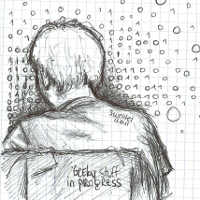projects

This article is a stub. You can help the IndieWeb wiki by expanding it.
There are many projects you can use to get your site on the IndieWeb, improve your IndieWeb support, or browse for inspiration for your own project; please note, some development ability and familiarity with command line tools will likely be required for you to use and improve these projects.
For simpler services you can use to get on the IndieWeb without using a command line, see:
Most projects are open source (AKA free software, F/OSS, FLOSS or FOSS), if you’re looking for starting points in a particular programming language, see:
Get On The IndieWeb
These projects are:
- IndieWeb friendly
- Actively in use by many
- Typically in use by their creators (embodying the use what you make principle)
- Can be installed on a website to get you on the IndieWeb
- Open source
In rough order of adoption and active use by the IndieWeb community:
Known
Known (formerly idno) is open source publishing software that supports a great degree of IndieWeb technologies and principles by default and is used by many IndieWeb for their primary site.
Notable examples:
 Ben Werdmüller (co-founder) on werd.io (eats what they cook)
Ben Werdmüller (co-founder) on werd.io (eats what they cook)- Erin Jo Richey (co-founder) on erinjo.is (eats what they cook)
See Known#IndieWeb_Examples for more!
Known has an active IndieWeb development community:
WordPress
WordPress is open source software you can use to create a website or blog. Many IndieWebCamp participants use WordPress on their primary site with a set of plugins developed by members of this community to provide IndieWeb functionality.
Notable IndieWeb community examples, all plug-in authors, all eat what they cook:
See WordPress Examples for more!
WordPress has an active IndieWeb development community:
micro.blog
micro.blog is a hosted microblogging service that lets you publish content on the web and interact with other community members who use the site in their custom platform.
micro.blog implements various IndieWeb features such as rel=me links, offering support for adding a personal domain to your site, and syndication features.
IndieWeb participants who use micro.blog for their main site include:
Many more community members syndicate their sites to micro.blog, too.
Jekyll
Jekyll is a blog-aware, static site generator.
IndieWebCamp participants who are using it on their primary self-identifying site:
- Ben Ward (2011,2012): benward.me
- Bret Comnes (2013): bret.io
 Pelle Wessman on voxpelli.com
Pelle Wessman on voxpelli.com Eddie Hinkle on eddiehinkle.com
Eddie Hinkle on eddiehinkle.com Ted Tschopp on tedt.org
Ted Tschopp on tedt.orgJacky Alciné on jacky.wtf
 Jeff Noh on jnoh.net
Jeff Noh on jnoh.net- ...
Drupal
Drupal is a popular open source content management system. It needs better documentation for how to install and set it up as an IndieWeb friendly personal site.
Notable examples:
- Dries (Drupal creator) uses Drupal on his own site "dri.es". (eats what they cook)
 Kristof De Jaeger (Drupal indieweb plugin creator) uses Drupal on his own site "realize.be" (eats what they cook)
Kristof De Jaeger (Drupal indieweb plugin creator) uses Drupal on his own site "realize.be" (eats what they cook)- ...
Hugo
Hugo is a blog-aware, static site generator.
IndieWebCamp participants who are using it on their primary self-identifying site:
 Jamie Tanna uses it on his site www.jvt.me
Jamie Tanna uses it on his site www.jvt.me Evgeny Kuznetsov uses it
Evgeny Kuznetsov uses it Ben Neil uses it
Ben Neil uses it- ...
Statiq
Statiq Web is a static web site generation toolkit built with .NET suitable for most use cases. It's built on top of Statiq Framework so you can always extend or customize it beyond those base capabilities as well.
Connect With Services
The following projects are actively being used by both their creators (following the use what you make principle) and many others in the IndieWeb community as additions to or services to enhance their personal sites with connections to and interactions with other content sites.
Bridgy
Bridgy is a service that backfeeds replies to your POSSE copies to your site, and publishes POSSE copies to your silo profiles.
IndieWebCamp participants that are using it with their primary site:
 Ryan Barrett (author) on https://snarfed.org/ (eats what they cook)
Ryan Barrett (author) on https://snarfed.org/ (eats what they cook) Tantek Çelik on http://tantek.com/ to receive backfeed Webmentions, and by Falcon (also on tantek.com) to POSSE photos, videos, RSVPs, issues to silos.
Tantek Çelik on http://tantek.com/ to receive backfeed Webmentions, and by Falcon (also on tantek.com) to POSSE photos, videos, RSVPs, issues to silos. Jamie Tanna uses it on https://www.jvt.me for Twitter backfeed and publish, and Meetup publish
Jamie Tanna uses it on https://www.jvt.me for Twitter backfeed and publish, and Meetup publish- many others...
Webmention.io
webmention.io is an open-source project written in Ruby and a hosted service for receiving webmentions and pingbacks on behalf of your IndieWeb site.
IndieWebCamp participants who are using it on their own site:
Get Inspired
These projects are:
- IndieWeb friendly
- Actively in use only by one or a few
- Their creator(s) are using what they make
- Sometimes can be installed on a website to get you on the IndieWeb.
- At least partially open source
The following projects are actively being used at a minimum by their creators for their own personal sites (using what they make) and have excellent examples of IndieWeb sites both in design, and IndieWeb feature support.
These projects may not yet be easily installable by someone other than the creator(s).
These projects often provide building blocks functionality or more in the form of open source shared libraries or functions which can help bootstrap anyone looking to build their own IndieWeb solution.
Alphabetically ordered:
Dobrado
dobrado is a multi user content management system written in PHP and Javascript. It's designed to make it easy to create and edit pages without any technical knowledge. Installation can be done using Git or downloading the latest zip archive (to install software onto your server) and editing one configuration file.
IndieWeb community examples:
 Malcolm Blaney (author) on unicyclic.com/mal since 2013-06-20 (eats what they cook)
Malcolm Blaney (author) on unicyclic.com/mal since 2013-06-20 (eats what they cook)
Falcon
Falcon is a personal publishing and content presentation system written in PHP and CASSIS.
Open source:
- re-usable functions shared in https://github.com/tantek/cassis (cassisproject.com, @cassisjs)
IndieWebCamp participants who are using it on their primary site:
 Tantek Çelik (author) on http://tantek.com/ since 2010-01-01. (eats what they cook)
Tantek Çelik (author) on http://tantek.com/ since 2010-01-01. (eats what they cook)- ...
FrancisCMS
FrancisCMS is an IndieWeb-friendly open source content management system built with Ruby on Rails. Installation is of moderate difficulty for someone familiar with Rails. The documentation is pretty thorough but does require some specific knowledge.[1]
Examples:
 Jason Garber on sixtwothree.org since 2016-01-14 (publicly announced 2016-02-10) (eats what they cook)
Jason Garber on sixtwothree.org since 2016-01-14 (publicly announced 2016-02-10) (eats what they cook)
Indiekit
Indiekit is a self-hosted Node.js server that uses the Micropub API to publish content to a content store, be that a local file system destination, an FTP server or Git repository. A high degree of customisation is provided, and a plug-in API enables integration with other services and protocols.
IndieWebCamp participants that are using it on their primary site:
 Paul Robert Lloyd (author) on paulrobertlloyd.com since 2019 (eats what they cook)
Paul Robert Lloyd (author) on paulrobertlloyd.com since 2019 (eats what they cook)
kaku
kaku is a personal publishing static site toolset.
IndieWebCamp participants that are using it on their primary site:
 bear (author) on http://bear.im/bearlog/ (eats what they cook)
bear (author) on http://bear.im/bearlog/ (eats what they cook)- ...
Publ
Publ is  fluffy's blogging and content management platform which uses category-based templates that provide content-appropriate presentation to different kinds of content (blogs, music, comics, art, and many more).
fluffy's blogging and content management platform which uses category-based templates that provide content-appropriate presentation to different kinds of content (blogs, music, comics, art, and many more).
p3k
p3k is personal publishing platform.
IndieWebCamp participants that are using it on their primary site:
 Aaron Parecki (author) on http://aaronparecki.com/ (eats what they cook)
Aaron Parecki (author) on http://aaronparecki.com/ (eats what they cook) Dora on http://indiewebcat.com/ (catfooding)
Dora on http://indiewebcat.com/ (catfooding)- ...
Twyne
A blogging system in which everything is a post. Supports syndications, replies, and a bunch of other indieweb ideas. User manual: https://twyne.readthedocs.io/
In use at:
WWWTech
WWWTech is open source personal publishing software written in Phoenix. See its Github repo. IndieWebCamp participants that are using it on their primary site:
Christian Kruse (author) on https://wwwtech.de/ (eats what they cook)
- ...
Additional Site Options
These projects are:
- Not IndieWeb friendly by default (require additional work to interoperate)
- Actively in use by some (or on major sites)
- Sometimes their creator(s) use what they make
- Sometimes can be installed on a website to get you on the IndieWeb.
- Sometimes open source, or source available to paid users
The following projects either may be production quality or have IndieWeb community members using them on their own domains, however likely require non-trivial additional work (possibly coding) to add IndieWeb support, and are often are not actively used by their creators.
If you like challenges and helping people at the same time, these might be for you.
Try one out with your own site, and if you like it, jump in with code contributions to make it IndieWeb friendly (either by default or by following easy setup/plugin instructions), become an active developer on the project, and help elevate it up to use what you make status!
MediaWiki
MediaWiki is software you can install to create a wiki website.
Perch
Perch and Perch Runway are a content management systems based on PHP+MySQL. Offered in two flavors, Perch is for smaller sites and Perch Runway geared for sites which have large collections of content. Webmention is supported via plugin and the developers behind Perch have shown active interest in adding additional IndieWeb functionality.
- Template:drewm (co-creator) on his own site
ProcessWire
ProcessWire is an open source content management system/content management framework.
IndieWeb participants that are using it on their personal site:
 gRegor Morrill on gregorlove.com
gRegor Morrill on gregorlove.com
- contributed modules for indieweb protocols: Webmention, IndieAuth, and working on Micropub
WikiSuite
WikiSuite is open source software that can be used to run a website.
Notable users:
- Marc Laporte (creator, eats what they cook)
Side Projects
The following projects may add some independent / decentralized functionality to an existing IndieWeb site. Consider them only after you have your personal site setup to post content etc.
Libravatar
libravatar is software that can provide independent avatar hosting (like Gravatar, but decentralized)
IndieWebCamp participants who are using it:
- cweiske (2013+) - runs his own avatar server at http://avatar.cweiske.de/
- François Marier (2013+)

Other Projects
Have you found another project that claims to be IndieWeb, or federated, or decentralized, or distributed and think it should be listed here or are not sure if it should be? Then:
Ask Questions
There are two pretty simple questions you can ask that will help you sift through perhaps 99% of the other projects out there.
- Are there human names of project creators on the project home page?
- Does the project have actual humans behind it who are proud enough of it to put their names on it?
- If the creators of the project are so unsure of it that they do not want to put their names on the home page, then you should likely also be skeptical about it. You can stop here.
- Does the project have actual humans behind it who are proud enough of it to put their names on it?
- Are the creators using what they make?
- If you found the names of the actual humans behind the project, then you should be able to find their personal sites. If not, you can also stop here, because if the creators themselves do not have personal sites, it is unlikely that they (or their project) will empathize with those with personal sites.
- Do their personal websites use their own project? This is perhaps the most important question for determining whether a project is real and usable or not. If the creators of the project themselves are not confident enough in their project to use it on their own personal sites, why should you?
- Note the emphasis on personal website which is key to use what you make. It’s nice (but not necessary, nor sufficient) that the project website (if any) uses the project itself.
If you have answered a firm YES to these two questions about a project, you may add that project to this page (like to the end of the Get Inspired section) with names, personal sites, and citations of how those sites are using the project.
below this line is...
Under Construction
Experimental
Stuff that you've at least got running on your own site, but is perhaps not stable/reliable enough for general sharing / use by others. Still useful to document what you *do* have running and use, share some of the code/design/UX, and lessons learned. Roughly ordered first by how "complete" the blogging/posting functionality is with known (URL required) attendee users, then other content tools, and other building blocks.
Experimental blogging / content hosting projects sorted by number of IndieWeb community members actively using them on their own primary personal site (and then alphabetically).
Bundle
Bundle is a set of publishing tools for the IndieWeb built using Python and Django.
Depends on:
Status:
- Experimental. Some parts are open source installable by others e.g. Connection.
Useage by IndieWeb community members:
- Kartik Prabhu (author) on Parallel Transport (eats what they cook)
- ...
gopost
gopost is a simple tool to make posts to several social networks and also generate a webtemplate-snippet to embed in your (static) website. It is written in Go and runs as single Application. It is work in progress.
gopost can be found on GitHub and is developed by Alexander Kulbartsch.
Hakkan
Hakkan is a personal publishing toolkit. It is being used to generate and aggregate content for Bear's Log.
IndieWeb related functions shared in Ronkyuu
- WebMention
- Rel=me
IndieWebCamp participants who are using it on their primary site:
- Bear (author) on https://bear.im/bearlog (eats what they cook)
- ...
pump.io
Pump.io is "a stream server that does most of what people really want from a social network."
IndieWebCamp participants who are using it on their own site:
- Evan Prodromou on https://identi.ca/evan (eats what they cook)
 AJ Jordan on https://pump.strugee.net/alex (eats what they cook)
AJ Jordan on https://pump.strugee.net/alex (eats what they cook)- ...
sadlittlewebjournal
sadlittlewebjournal is a Weblog written in Perl that uses PostgreSQL or MySQL and a straightforward ASCII interface. Site maintenance is done via an intuitive backend that allows one to add, delete, and modify previous entries. Other features include an integrated guestbook, a Web stat chart complete with ASCII bar graphs, and various other modularized features.
Current POSSE feature include publishing news posts to an external Twitter or StatusNet feed, but the PESOS alternative is also supported: republishing posts syndicated from such a feed. On the roadmap are comments using webmentions and microformats.
IndieWeb enthusiasts currently using it on their own site:
- Jeremy Malcolm (main developer) on jere.my (eats what they cook)
- ...
Taproot
Taproot is Barnaby Walters’ publishing software. It’s written in PHP 5.4 and drives most of waterpigs.co.uk. It is not currently released to the public, although parts of it are.
IndieWebCamp participants who are using it on their own site:
- Barnaby Walters (author) on http://waterpigs.co.uk (eats what they cook)
- ...
Transformative
Transformative is  Barry Frost's open source IndieWeb personal website software, in use at barryfrost.com since 2016-11-10. All Ruby source code is available on GitHub.
Barry Frost's open source IndieWeb personal website software, in use at barryfrost.com since 2016-11-10. All Ruby source code is available on GitHub.
IndieWebCamp participants who are using it on their own site:
 Barry Frost (author) on https://barryfrost.com (eats what they cook)
Barry Frost (author) on https://barryfrost.com (eats what they cook)- ...
Postly
Postly is Ben Roberts' blogging platform. Based in PHP and MySQL it aims to be a platform for easy creation of experimental features. The source code is available on GitHub.
IndieWeb enthusiasts currently using it on their own site:
- Ben Roberts on ben.thatmustbe.me
- ...
Voto
Voto is Vasilis van Gemert's personal photo gallery. He's written about the ideas behind it on his blog.
IndieWeb enthusiasts currently using it on their own site:
triki
triki is semantic web server used to publish blogs, recommendations, photos, albums and really any sort of content. Supports groups to control sharing with groups/friends. Written in Java with Apache JENA triplestore back-end. Supports IndieAuth and Activity Streams 2.0. Next up is Microblog.
IndieWebCamp participants that are using it on their own site:
neopub
The blogging software that runs micro.geheimesite.nl. It is written in PHP and saves posts in a large JSON file that is reset every year. It has a built-in micropub endpoint that sends webmentions. Supports notes, replies, bookmarks, likes and reposts.
Other Experimental Projects
Other projects which are experimental quality but are not primary blogging / content hosting projects (the heart of an IndieWeb site).


